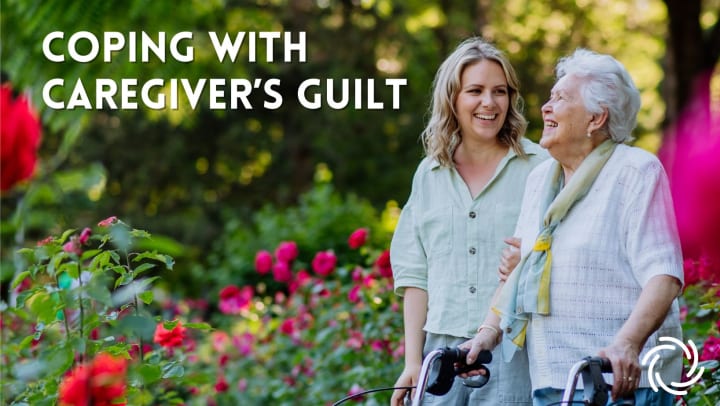Feelings of guilt can add stress to a caregiver’s already overflowing plate. These emotions can range from resentment and frustration to feelings of inadequacy and hopelessness. Many caregivers find themselves desperately in need of a break, yet unable or unwilling to reach out for help. In times of stress, we often neglect our own needs and can be self-critical.
Caregiver’s guilt can also stem from unresolved issues with your loved one and can be compounded by challenging family dynamics, or unrelated problems in our personal lives. Even in the best of circumstances, caring for an aging loved one can be an emotionally taxing experience.
Understanding Caregiver’s Guilt
Caregiver’s guilt can stem from many things:
- Time constraints. Many caregivers juggle the needs of their loved one with the demands of work, family, and personal responsibilities. At times they may struggle with neglecting other important relationships and aspects of their lives.
- Financial burden. The cost of caregiving, whether in terms of medical and living expenses or lifestyle adjustments can be overwhelming. Caregivers may feel guilty about the financial strain it places on their families.
- Unrealistic expectations. Caregivers often have high expectations of themselves and may feel inadequate if they perceive they are falling short.
- Personal sacrifices. Caregiving often requires significant personal sacrifices, including career, social life, and personal goals. This can lead to feelings of isolation and disappointment.
- Decision-making. Caregivers often need to make difficult decisions on behalf of their loved one, including medical treatments and living arrangements. Shouldering the responsibility for these choices can make one feel pressured and unsure.
Strategies for Coping With Caregiver’s Guilt
While caregiving can be physically and emotionally taxing, it can also be very rewarding. If you find yourself consumed with feelings of guilt, know that you are not alone. There are strategies you can lean on.
- Self-compassion. Be kind to yourself. Understand that you are doing your best in a challenging situation. Acknowledge your own needs and limitations. Set realistic expectations for yourself and for your loved one’s care.
- Seek support. You are not alone in your caregiving journey. Reach out to support groups, friends, and family members who can provide emotional support and share their experiences. Talking to others who understand what you’re going through can be immensely comforting. Don’t hesitate to consult healthcare professionals, therapists, or counselors if you find your circumstances overwhelming.
- Respite care. Take breaks when necessary. Consider respite services that allow you to recharge and take care of yourself. Remind yourself that you will provide the best care for your loved one when your own needs are met.
- Embrace self-care. Prioritize self-care activities such as exercise, meditation, and relaxation techniques. Nurturing your own physical and emotional well-being is essential to being an effective caregiver.
- Communication. Maintain open and honest communication with your loved one. Discuss their wishes, preferences, and concerns regarding their care. Involving your loved one in decisions can alleviate the guilt associated with making choices on their behalf.
- Senior living. If your loved one is not already in a senior living community, consider the possibility that it may be time to make a move. This can be a positive experience for you both. Your loved one will be surrounded by new friends, a dedicated care team, cognitively stimulating activities, and a comfortable home. With your loved one in senior living, you can enjoy and nurture your relationship without the stressors of caregiving.
Caring for a loved one can take a toll. Guilt is a natural response to the challenges that caregiving presents. By practicing self-compassion, setting realistic expectations, seeking support, and prioritizing self-care, you can navigate the caregiving journey with love and grace while minimizing the burden of guilt.
Interested in learning more about MBK’s senior living communities? Find a location near you and request a tour today!





